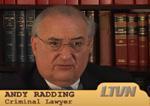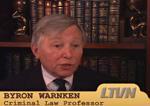Reasonable Doubt
ANDY RADDING: The jury must believe beyond any doubt that is reasonable and rationale that the defendant has been proven guilty.
BYRON WARNKEN: Not beyond all doubt, but beyond a reasonable doubt.
ANDY RADDING: There cannot be a reasonable rational doubt to the guilt.
BYRON WARNKEN: It is very inexact, it is very amorphous, but it means we are pretty sure.
ANDY RADDING: It is interesting because certain things are not capable of a precise definition.
BYRON WARNKEN: You cannot really quantify it.
ANDY RADDING: You cannot give it a number.
BYRON WARNKEN: But if you had to quantify it, it probably means, I don't know, probably about an 85% degree of certainty.
ANDY RADDING: I would like to believe that it is higher than 85.
BYRON WARNKEN: We can find people guilty of crimes, send them to jail for a long time, even execute them when we do not know with certainty. But we have to get as close to that as possible. We have to have proof beyond a "reasonable" doubt.
ANDY RADDING: Very different from the civil standard, which is "preponderance of the evidence," which is 50.1%.
BYRON WARNKEN: I am suing a doctor in malpractice, where there was a terrible operation and somebody died. That is an important case, but we are willing to accept a 49% risk of error - meaning, we are going to ask the jury can you find that the plaintiff persuaded you by a preponderance of the evidence, a little more than 50/50.
ANDY RADDING: Beyond a reasonable doubt, a much stronger standard because we are dealing with peoples' lives and liberty.
What Exactly IS Proof Beyond a Reasonable Doubt?
We are all presumed innocent until proven guilty. But just how much proof of guilt is enough?
Hmm. Good question. Even the lawyers lack a precise answer, as is evident in this video. Indeed, as these legal experts concede, it's extremely hard to quantify "proof beyond a reasonable doubt."
So, when a judge instructs the jury on proof beyond a reasonable doubt, you will find the typical jury instruction devoid of objective measurement:
The law presumes the defendant to be innocent of crime. Thus the defendant, although accused, begins the trial with a "clean slate" -- with no evidence against him/her. And the law permits nothing but legal evidence presented before the jury to be considered in support of any charge against the accused. So the presumption of innocence alone is sufficient to acquit the defendant, unless the jurors are satisfied beyond a reasonable doubt of the defendant's guilt after careful and impartial consideration of all the evidence in the case.
It is not required that the state prove guilt beyond all possible doubt. The test is one of reasonable doubt. A reasonable doubt is a doubt based upon reason and common sense -- the kind of doubt that would make a reasonable person hesitate to act. Proof beyond a reasonable doubt, therefore, must be proof of such a convincing character that a reasonable person would not hesitate to rely and act upon it.
The jury will remember that a defendant is never to be convicted on mere suspicion or conjecture. The burden is always on the state to prove guilt beyond a reasonable doubt. This burden never shifts to a defendant, for the law never imposes upon a defendant in a criminal case the burden or duty of calling any witnesses or producing any evidence.
So, if the jury, after careful and impartial consideration of all of the evidence in the case, has a reasonable doubt that the defendant is guilty of the charge, it must acquit. If the jury views the evidence in the case as reasonably permitting either of two conclusions---one of innocence, the other of guilt---the jury should of course adopt the conclusion of innocence.
Though the legal experts can't seem to give it a precise definition, some have described a "reasonable doubt" as "any doubt which would make a reasonable person hesitate in the most important of his or her affairs." Now, that can mean many different things to many different people. While this is designed to be a very high standard of proof, it doesn't require absolute certainty. Indeed, people have gone to the gas chamber when jurors didn't know for sure whether they committed the crime charged -- a daunting proposition when you consider the fact that no one really knows for sure what proof beyond a reasonable doubt really is.



